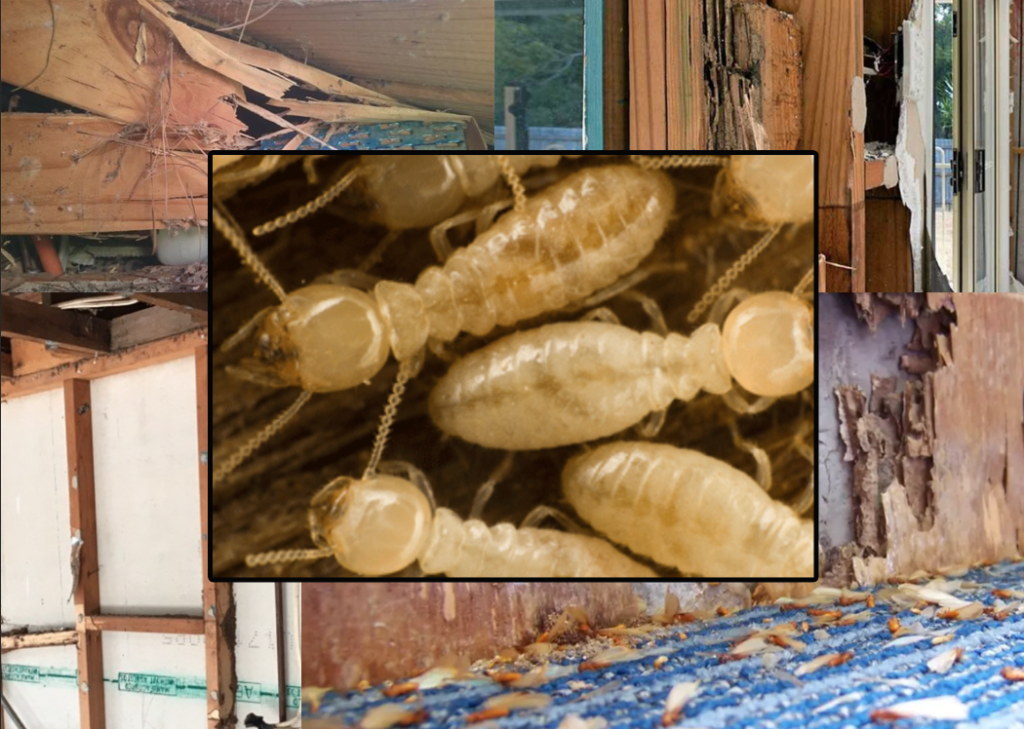
What If Your House Failed A Termite Inspection?
When you discover that your house has failed a termite inspection, it can be a cause for concern. Termites are known for their ability to cause irreparable extensive damage to wooden structures, potentially leading to costly repairs. However, with the right (and in most cases, professional) approach, you can effectively manage this situation and protect your property from further harm. In this article, we will explore all the necessary steps to take following a failed termite inspection, ensuring you are well informed and prepared to tackle the issue head-on.
Reasons for A Failed Termite Inspection
A house may fail a termite inspection for several reasons, each indicating the presence or risk of termite activity that could harm the property’s structure. Understanding these reasons is crucial for homeowners to address the issues effectively and to prevent future infestations. Here are some common reasons why a house might fail a termite inspection:
- Active Termite Infestation: The most straightforward reason for failing an inspection is the presence of live termites within the structure. Inspectors may find termites actively consuming wood or discover their nests in or around the home.
- Evidence of Past Infestations: Signs of past termite activity, such as discarded wings, termite droppings (frass), or mud tubes, can also result in a failed inspection. Even if the termites are no longer present, evidence of their past activity suggests that the property is at risk and may have underlying damage.
- Structural Damage: Termites can cause severe structural damage to the wood components of a house, including beams, joists, and flooring. During an inspection, if structural damage that compromises the integrity of the building is detected, it can lead to a failed report.
- High Moisture Levels: Termites are attracted to moisture, and high moisture levels in a home can create a thriving environment for termites to thrive. Inspectors might fail a house if conditions are conducive to termite activity, such as water damage, leaks, or poor drainage around the foundation.
- Wood-to-Ground Contact: Wood that is in direct contact with the soil, such as deck posts, firewood, door frames, or siding, provides an easy access point for termites to enter the structure. This condition can lead to a failed termite inspection because it significantly increases the risk of infestation.
- Inadequate Ventilation: Poor ventilation in crawl spaces, basements, and attics can lead to excess moisture, which attracts termites. Inspectors looking for signs of adequate ventilation might fail a house if they determine that the conditions could support termite colonization.
- Presence of Conducive Conditions: Other conditions that may lead to a failed termite inspection include the presence of firewood or lumber piles near the home, decaying trees and stumps in close proximity, and any cellulose-based materials that come into contact with the house and could serve as food for termites.
Identify the Extent of the Damage
Addressing the reasons for a failed termite inspection is essential for protecting property from the potential damage termites can cause. Homeowners should take corrective actions based on the inspector’s recommendations, which might include treating the infestation, repairing structural damage, reducing moisture levels, and modifying conditions that could attract termites in the future.
The first step after a failed termite inspection is to assess the termite damage’s extent accurately. This involves a thorough examination of your property to identify all affected areas. It’s crucial to understand the scope of the problem before proceeding with any repair or treatment plans. Professional pest control services can provide a detailed report highlighting the specific areas that need attention.
Consult with Termite Control Professionals
Once you clearly understand the damage, the next step is to consult with termite control professionals. These experts can guide you on the most effective treatment options available. From chemical treatments to baiting systems, several methods exist to eradicate termites and prevent future infestations. A professional will recommend a tailored solution based on the infestation’s severity and your property’s specific needs.
Consider the Treatment Options
There are generally two main types of termite treatment options: liquid termiticides and baiting systems. Liquid termiticides involve applying a chemical barrier around your home’s foundation to kill and deter termites. On the other hand, Baiting systems use bait stations to attract and eliminate termite colonies over time. Each method has its advantages, and selecting the right one depends on various factors, including the infestation’s location and severity.
Repair Termite Damage
After addressing the termite infestation, repairing any damage caused by the pests is essential. This may include replacing weakened wooden structures, such as beams and floorboards, to ensure the integrity of your home. Structural repairs may sometimes be necessary to restore stability and safety. It’s important to address these repairs promptly to prevent further deterioration.
Prevent Future Infestations
Preventing future termite infestations is key to protecting your property long-term. This includes regular inspections, maintaining a dry environment around your home’s foundation, and eliminating wood-to-ground contact where possible. Consider applying a preventive termite treatment around your property to deter future infestations.
Stay Vigilant and Monitor Your Home
Regular monitoring of your home is crucial to detecting and addressing any signs of termite activity early on. This includes checking for mud tubes, wood damage, and termite wings around your property. Establishing a routine inspection schedule with a pest control professional can help ensure your home remains termite-free.
Additional tips – What if Your House Failed a Termite Inspection?
Here are further measures and considerations that can fortify your efforts in managing termite infestations and safeguarding your property against future threats.
Engage in Professional Termite Inspection and Monitoring
Regular professional inspections are vital in the early detection and management of termite presence. Engaging in a contract with a reputable pest control service for periodic checks can provide peace of mind and prevent the recurrence of infestations. These experts utilize advanced tools and techniques to spot termite activity that might not be visible to the untrained eye.
Implement Landscaping and Maintenance Practices
Landscaping and maintenance practices play a significant role in termite prevention. Ensure that soil, mulch, or wood piles are kept at a distance from the foundation of your house to avoid creating hospitable conditions for termites. Regularly clean your gutters and downspouts to prevent water accumulation near your home’s foundation, as moisture attracts termites.
Optimize Structural Defenses
In addition to chemical treatments and baiting systems, optimizing your home’s structural defenses can provide an extra layer of protection against termites. Consider using termite-resistant building materials for renovations or repairs, especially in areas most vulnerable to termite damage. Materials such as treated wood, metal, or concrete can deter termites and minimize the risk of infestation.
Educate Yourself and Your Household
Awareness and education about termite prevention can be a powerful tool. Inform yourself and members of your household about the signs of termite activity and the importance of maintaining practices that discourage termite infestations. A collective effort can significantly enhance the effectiveness of your termite management strategy.
Consider the Financial Aspect
Dealing with termite damage and treatment can involve considerable expenses. It’s wise to explore financial planning options such as insurance coverage for termite treatment and damage repair or setting aside a contingency fund for unforeseen pest-related issues. Additionally, obtaining multiple quotes and service proposals from different pest control companies can help you make informed decisions that balance cost and effectiveness.
Legal and Disclosure Requirements
If you’re planning to sell your home, be aware of the legal requirements and implications of a termite infestation. In many jurisdictions, sellers are obligated to disclose termite inspections and any known infestations to potential buyers. Ensuring that your termite management efforts are documented and transparent can safeguard against legal complications and contribute to a trustworthy selling process.
Stay Informed About Termite Control Advances
The field of pest control, particularly termite management, is continuously evolving. Staying informed about the latest advances in termite treatment technologies and methodologies can help you make educated decisions about protecting your property. Whether adopting eco-friendly treatment options or leveraging new detection technologies, being proactive in your approach can lead to more effective and sustainable outcomes.
Conclusion – What if Your House Failed a Termite Inspection?
Failing a termite inspection can be alarming, but you can effectively manage the situation and protect your property with the right approach. You can eliminate termites and prevent future infestations by assessing the damage, consulting with professionals, and choosing the appropriate treatment. Remember, prompt action and ongoing vigilance are key to managing termite problems.
Furthermore, successfully navigating the aftermath of a failed termite inspection is a multifaceted endeavor that encompasses assessment, treatment, repair, prevention, and continuous monitoring. By adopting a holistic approach that integrates professional expertise, preventive maintenance, structural defenses, education, financial planning, legal diligence, and staying abreast of technological advancements, you can effectively manage termite issues and secure your property’s integrity and value over the long term.
Protecting your home from termites is an ongoing commitment. By implementing the strategies outlined in this article, you can enhance your home’s resilience against termites, ensuring it remains safe, sound, and secure for years to come.

